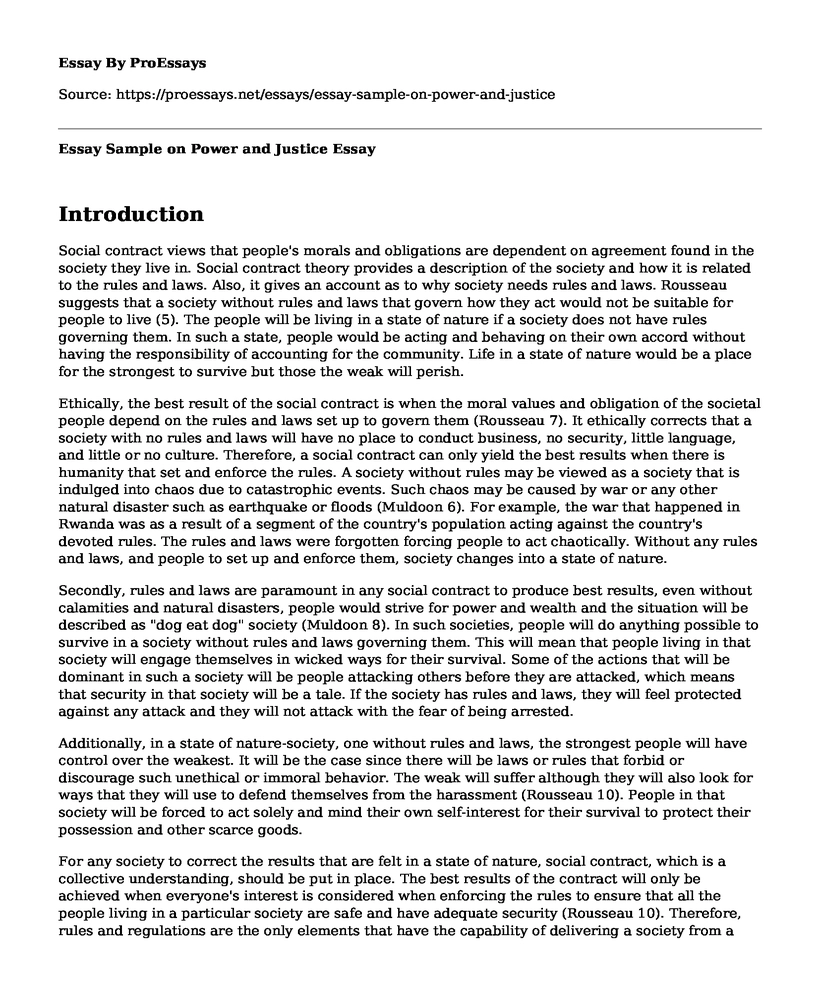Introduction
Social contract views that people's morals and obligations are dependent on agreement found in the society they live in. Social contract theory provides a description of the society and how it is related to the rules and laws. Also, it gives an account as to why society needs rules and laws. Rousseau suggests that a society without rules and laws that govern how they act would not be suitable for people to live (5). The people will be living in a state of nature if a society does not have rules governing them. In such a state, people would be acting and behaving on their own accord without having the responsibility of accounting for the community. Life in a state of nature would be a place for the strongest to survive but those the weak will perish.
Ethically, the best result of the social contract is when the moral values and obligation of the societal people depend on the rules and laws set up to govern them (Rousseau 7). It ethically corrects that a society with no rules and laws will have no place to conduct business, no security, little language, and little or no culture. Therefore, a social contract can only yield the best results when there is humanity that set and enforce the rules. A society without rules may be viewed as a society that is indulged into chaos due to catastrophic events. Such chaos may be caused by war or any other natural disaster such as earthquake or floods (Muldoon 6). For example, the war that happened in Rwanda was as a result of a segment of the country's population acting against the country's devoted rules. The rules and laws were forgotten forcing people to act chaotically. Without any rules and laws, and people to set up and enforce them, society changes into a state of nature.
Secondly, rules and laws are paramount in any social contract to produce best results, even without calamities and natural disasters, people would strive for power and wealth and the situation will be described as "dog eat dog" society (Muldoon 8). In such societies, people will do anything possible to survive in a society without rules and laws governing them. This will mean that people living in that society will engage themselves in wicked ways for their survival. Some of the actions that will be dominant in such a society will be people attacking others before they are attacked, which means that security in that society will be a tale. If the society has rules and laws, they will feel protected against any attack and they will not attack with the fear of being arrested.
Additionally, in a state of nature-society, one without rules and laws, the strongest people will have control over the weakest. It will be the case since there will be laws or rules that forbid or discourage such unethical or immoral behavior. The weak will suffer although they will also look for ways that they will use to defend themselves from the harassment (Rousseau 10). People in that society will be forced to act solely and mind their own self-interest for their survival to protect their possession and other scarce goods.
For any society to correct the results that are felt in a state of nature, social contract, which is a collective understanding, should be put in place. The best results of the contract will only be achieved when everyone's interest is considered when enforcing the rules to ensure that all the people living in a particular society are safe and have adequate security (Rousseau 10). Therefore, rules and regulations are the only elements that have the capability of delivering a society from a state of nature to a flourishing society for the weakest to survive. As social contract is inherited at birth and it is not a written document, it dictates that there will be no breaking of laws or certain moral codes and in return, the people will benefit from the society in terms of education, security, and other important asset for survival.
Conclusion
In an ethical manner, rules and laws to govern a society are essential in various reasons (Muldoon 17). Firstly, they do not harm principle protects the people from serious physical assault as well as protect those that might be victimized. Secondly, the principle of offence prevents people of society from behaviors that would offend some of them that might be victimized. Thirdly, the legal moralism prevents any immoral activities such as prostitution and gambling that might be conducted in society. The benefit to others dictates against any actions that might be detrimental to a particular population of the society (Muldoon 18). Lastly, legal paternalism focuses on how regulations prevent harm against any member of society. In recap, the ethical best result of a social contract is when people's morals and obligations are governed by the enforced rules and laws.
Works Cited
Muldoon, Ryan. Social contract theory for a diverse world: Beyond tolerance. Routledge Taylor & Francis Group, 2016.Rousseau, Jean-Jacques. Rousseau: The Social Contract and other later political writings. Cambridge University Press, 2018.
Cite this page
Essay Sample on Power and Justice. (2022, Dec 08). Retrieved from https://proessays.net/essays/essay-sample-on-power-and-justice
If you are the original author of this essay and no longer wish to have it published on the ProEssays website, please click below to request its removal:
- Gender Roles in Literature Essay
- Speech on Ethnographic Study of Language Use in Interpersonal Communication
- Major Ethnic Groups in Nigeria Essay
- Essay Sample on Community Practice Definition and Brief History
- Essay Sample on Urbanisation: Impact on Society & Ways to Adapt
- Essay Example on God Bless the Child: US Response to Juvenile Prostitution
- Marriage: A Dying Institution or an Opportunity to Thrive? - Essay Sample







